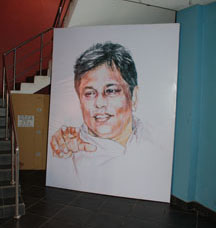On Tuesday, I revisited three cases CPJ had investigated last year, dating from January 2009: the attack on Sirasa TV; the murder of newspaper editor Lasanatha Wickramatunga, and the violent attack on another editor, Upali Tennakoon and his wife, Dhammika. Last year’s report was called Failure to Investigate. Today, I’ll take a look at the implications of the government’s failure to bring any of them to prosecution as the country moves toward presidential elections on January 26.
Court documents recently revealed that a coroner’s report found that Wickramatunga’s death was “caused not due to gunshot injuries, but injuries caused to his head with a sharp weapon.” Iron bars, wooden poles, pistols, silenced or not, what’s the difference? There is one.
Given the atmosphere last January, when the government’s offensive against journalists who were critical of the Rajapaksa government was at its highest, and the need to stifle any criticism of the government or its institutions as the military pursued its all out victory against the Liberation Tigers of Tamil Eelam (which finally came about in May), it seems to me that not only were these attacks meant to silence Sirasa, Wickramatunga, Tennakoon, and others, but they were intentionally done in such a terrifying way that it would give other journalists reason to stifle any critical reporting they might consider doing.
The vicious murder weapons, used by men ready to kill with their bare hands in broad daylight on a busy street with witnesses all around, were meant to send a message of total impunity much more threatening than anonymous drive-by shootings or secret assassinations. It was a message meant to terrorize any journalist who would dare challenge the powers that be.
As we reported in Failure to Investigate, Attorney General Mohan Peiris dismissed the idea of impunity for those who attack journalists: “I can tell you we have a policy of zero tolerance, zero tolerance,” he said. “There is no question of the government or the attorney general’s office accommodating or making concessions for criminals or criminal activities.” Some cases may have been delayed for lack of sufficient evidence, he said.
But the lack of advance in any of the cases in the last year denies his remarks’ credibility.
In all our advocacy in Sri Lanka, CPJ has never accused the government or the military of being involved in the many deaths, assaults, kidnappings, and threats that took place under President Mahinda Rajapaksa, though many of the Sri Lankan journalists we have spoken to over the years have accused them of complicity. What we have done is repeatedly call for full investigations, done in a timely manner, of the many unexplained attacks on journalists.
Why are the coroner’s findings appearing now? Why let Tissa out of his jail cell? Presidential elections are due in Sri Lanka on January 26. Running against President Rajapaksa is the former army commander, recently retired general Sarath Fonseka. He is counting on his stature as the military leader who finally beat the LTTE and brought peace to Sri Lanka to win votes. A softening mood toward the media by either side most likely reads well with some of the electorate, as well as the international community, which is watching the electoral process very carefully.
On January 7, Fonseka, the man many Sri Lankan journalists hold responsible for so much of the violence and intimidation directed against them, put forward his platform in the form of a manifesto. He promised greater press freedom and said he would scrap the press council which is empowered to shut down news organizations, and that he would introduce a freedom of information act. That sounds great but rings a bit hollow after, over the weekend, he sent letters to eight newspapers threatening to sue them for “publishing articles defamatory of his character,” according to Sri Lankan media reports.
Some give Fonseka an outsider’s chance of winning the vote, but many predict the Rajapaksa family will use the advantage of its incumbency to win another term in office. Either way, with either Rajakpaksa or Fonseka in office, it still looks like Sri Lanka will have a long way to go to before it gets a government with a full commitment to a free media.
A few follow ups: Whoever attacked Sirasa TV has never been brought to trial, and the investigation looks like it has ended, with no arrests. The Tennakoons fled Sri Lanka as soon as Upali was well enough to travel. They were given refugee status in the U.S. last year. There have been no arrests in their case. And, as I said, the next hearing in Wickramatunga’s case is on January 21. Given that it took one year for the court to release a coroner’s report, it is hard to expect a serious prosecution any time soon. Wickramatunga’s wife, Sonali, has established a Web site in his memory–UnbowedAndUnafraid–and on the anniversary of her husband’s death, she has sent an open letter to President Rajapkasa calling for a full investigation.
Last year, Sri Lanka ranked fourth worst in CPJ’s Global Index of Impunity, behind Iraq, Sierra Leone, and Somalia. We released that report in March, and we’ll do the same again this year.
